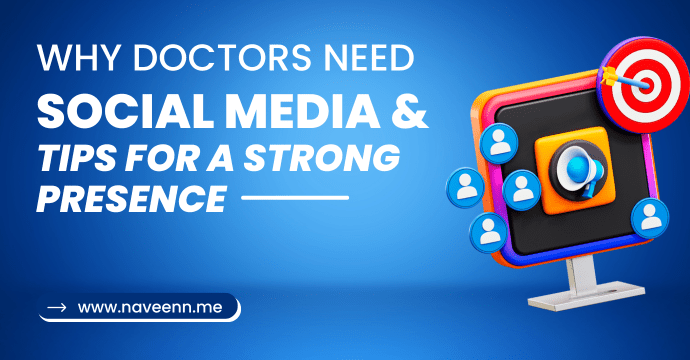In today’s digital age, social media is not just a platform for personal interactions or entertainment—it’s a powerful tool for professionals across various fields, including healthcare. For doctors, a strong social media presence can significantly impact their practice, professional reputation, and patient engagement.
If you’re a doctor considering stepping into the world of social media, this guide will help you understand why it’s essential and how to build a robust online presence.
Why Doctors Need Social Media
- Enhancing Patient Engagement: Social media platforms allow doctors to connect with patients beyond the confines of a clinical setting. By sharing educational content, health tips, and updates about their practice, doctors can keep their patients informed and engaged. This engagement can foster trust and strengthen the doctor-patient relationship.
- Establishing Authority and Credibility: In an era where misinformation is rampant, particularly in health and wellness, doctors can use social media to counteract false narratives. By sharing accurate, evidence-based information, they establish themselves as credible sources of knowledge. This authority not only benefits the public but also enhances the doctor’s reputation among peers and potential patients.
- Expanding Reach and Visibility: Social media platforms provide doctors with a unique opportunity to reach a broader audience. Whether you’re a specialist in a niche field or a general practitioner, it can help you connect with people outside your immediate geographical area. This increased visibility can lead to new patient referrals, collaborations with other healthcare professionals, and even media opportunities.
- Promoting Health Awareness: Doctors can leverage social media to promote public health initiatives and awareness campaigns. By participating in global health conversations or launching their own campaigns, doctors can contribute to the larger goal of improving public health. This proactive approach can also position them as thought leaders in their field.
- Networking and Professional Growth: Social media is not just about patient interaction—it’s also a valuable networking tool. Doctors can join professional groups, participate in discussions, and stay updated with the latest research and trends in medicine. This networking can lead to professional growth, collaboration opportunities, and staying at the forefront of medical advancements.
Read More: How to Measure the ROI of Your Digital Marketing Efforts
Tips for a Strong Social Media Presence
Choose the Right Platforms on Social Media
Not all platforms are created equal, and not all will be suitable for your professional goals. LinkedIn is excellent for networking with other professionals, sharing articles, and participating in industry discussions. Twitter is ideal for quick updates and engaging in public health conversations. Instagram and Facebook are great for sharing visual content, patient testimonials, and health tips. Choose platforms that align with your objectives and audience.
Create High-Quality Content
The content you share should reflect your expertise and be of value to your audience. Focus on creating educational posts, such as articles, infographics, and videos, that address common health concerns, debunk myths, and provide practical advice. High-quality content not only attracts followers but also encourages sharing, which can significantly increase your reach.
Engage Consistently
Social media success doesn’t happen overnight; it requires consistent effort. Regularly posting content, responding to comments, and engaging with your audience will help build a loyal following. Consistency also signals to your audience that you are active and reliable, which can enhance your credibility.
Maintain Professionalism
While social media can be informal, it’s essential to maintain a professional tone, especially as a healthcare provider. Avoid sharing overly personal information or engaging in controversial topics that could detract from your professional image. Remember, your social media presence is an extension of your practice and should reflect the same level of professionalism.
Be Mindful of Patient Privacy
One of the most critical aspects of a doctor’s social media presence is patient confidentiality. Never share patient information without explicit consent, and be cautious when discussing cases. HIPAA and other regulations still apply online, so it’s crucial to be aware of legal and ethical boundaries when posting content.
Use Visuals Effectively
Visual content typically outperforms other types on social media. Use high-quality images, videos, and infographics to make your posts more engaging. For example, a short video explaining a common medical procedure or an infographic on managing a chronic condition can resonate well with your audience.
Monitor Your Online Reputation
Your online reputation is just as important as your offline one. Regularly monitor mentions of your name or practice on social media, and respond to both positive and negative feedback. Addressing concerns professionally and promptly can mitigate potential damage to your reputation and demonstrate your commitment to patient care.
Collaborate with Influencers on Social Media
Collaborating with health influencers or other professionals can boost your visibility. By partnering with individuals who share your values and have a large following, you can reach new audiences and enhance your credibility. Ensure that any collaboration aligns with your professional standards and contributes positively to your brand.
Leverage Analytics
Most social media platforms offer analytics tools that provide insights into your audience’s behavior, the performance of your posts, and overall engagement. Use these tools to refine your strategy, understand what content resonates most with your audience, and optimize your efforts for better results.
Stay Updated with Trends
Social media is always evolving, with new trends emerging often. Stay updated with the latest features, algorithms, and best practices to keep your content relevant and engaging. Following industry leaders, attending webinars, and participating in online courses can help you stay ahead of the curve.
Conclusion
For doctors, a strong presence is more than just a marketing tool—it’s a way to educate, engage, and build trust with patients and the broader community.
By leveraging the power of social media, doctors can enhance their practice, promote public health, and establish themselves as leaders in their field.
With the right strategies and a commitment to maintaining professionalism, we can be a valuable asset in any doctor’s professional toolkit.
